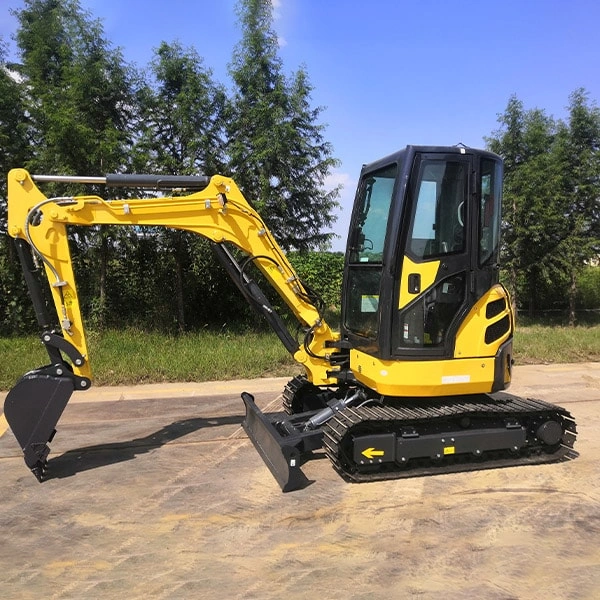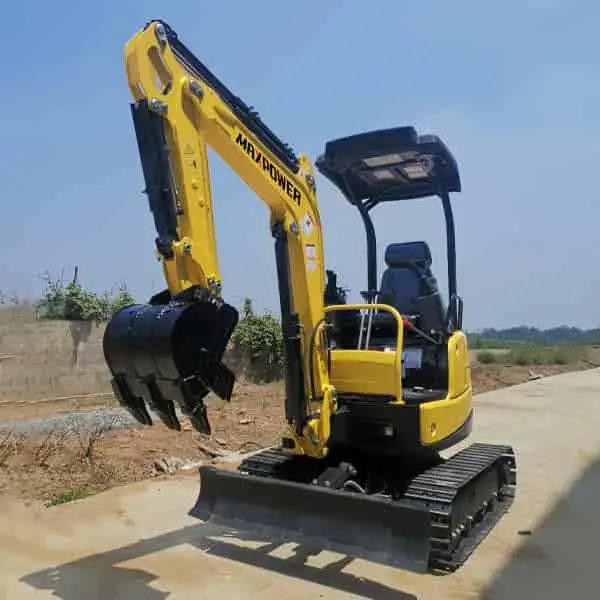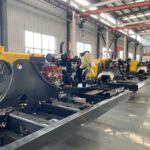Introduction
Compact excavators have become a staple in the construction industry due to their versatility, efficiency, and ability to work in tight spaces. This comprehensive guide will explore the features, benefits, and applications of compact excavators, providing insights into how these powerful machines can enhance your construction projects.
What is a Compact Excavator?

A compact excavator, often referred to as a mini excavator, represents a marvel of modern engineering, embodying versatility and efficiency in its compact form. These agile machines, powered by hydraulic or mechanical systems, excel primarily in excavating tasks, offering a myriad of functionalities beyond mere digging. Their design emphasizes maneuverability, distinguishing them from their larger counterparts and rendering them indispensable in tight, urban environments and confined spaces where larger equipment struggles to navigate.
The versatility of compact excavators extends far beyond their primary function of digging. Equipped with a variety of interchangeable attachments, they effortlessly transition between tasks, from trenching and grading to demolition and material handling. Their adaptability makes them indispensable across a spectrum of industries, including construction, landscaping, utilities, and agriculture.
In urban environments where space is at a premium, compact excavators shine, effortlessly maneuvering through narrow alleys, congested job sites, and residential backyards. Their diminutive size belies their power and capability, as they deftly navigate around obstacles and operate in spaces where larger equipment simply cannot reach.
Furthermore, the compact footprint of these excavators minimizes disruption to surrounding areas, making them ideal for projects in densely populated areas or sensitive environments. With their low noise emissions and reduced environmental impact, compact excavators exemplify the harmony between functionality and sustainability in modern construction practices.
In essence, compact excavators embody innovation and efficiency, empowering operators to tackle a diverse range of tasks with precision and ease. As urbanization continues to reshape our landscapes, these agile machines stand ready to meet the evolving demands of construction and development, proving that greatness truly comes in small packages.
Key Features of Compact Excavators
- Size: Ranging from 1 to 8 tons, compact excavators are smaller and more agile.
- Mobility: Easy to transport and can navigate through narrow spaces.
- Versatility: Equipped with various attachments for different digging, lifting, and grading tasks.
- Fuel Efficiency: Generally use less fuel than larger excavators, reducing operating costs.
The Evolution of Compact Excavators
Compact excavators have evolved significantly over the years, with advancements in technology enhancing their capabilities and making them more user-friendly.
Technological Advancements
- Hydraulic Systems: Modern compact excavators feature advanced hydraulic systems for improved power and control.
- Electronic Controls: Electronic control systems provide precise operation and increased efficiency.
- Zero Tail Swing: Newer models offer zero tail swing designs, allowing them to work in even tighter spaces.
- Cab Design: Enhanced cabs with better visibility, ergonomics, and climate control for operator comfort.
Applications of Compact Excavators
Compact excavators are used in a wide range of applications due to their size and versatility.
Common Applications
- Demolition: Breaking down small structures and buildings in urban areas.
- Trenching: Digging trenches for utilities, such as water, gas, and telecommunications.
- Landscaping: Excavating and grading soil for landscaping projects.
- Foundation Work: Digging and preparing for small building foundations and footings.
Table of Compact Excavator Applications and Benefits
| Application | Benefits |
|---|---|
| Demolition | Precision in tight spaces |
| Trenching | Accurate and clean cuts |
| Landscaping | Versatile for grading and digging |
| Foundation Work | Maneuverability in confined areas |
Benefits of Using Compact Excavators

There are several benefits to using small excavators on construction projects.
- Space Efficiency: Their compact size allows for work in tight areas where larger machines cannot fit.These mini machines are perfect for navigating through narrow pathways and getting the job done efficiently.
- Cost-Effective: Compact excavators have lower acquisition and operating costs compared to larger models. Small excavators are also easier to transport to and from job sites, making them a convenient choice for contractors with multiple projects in different locations. Additionally, their smaller size allows them to maneuver more easily in tight spaces, increasing efficiency and productivity on the job.
- Versatility: The ability to switch between various attachments makes them suitable for multiple tasks.
- Environmental Considerations: Lower fuel consumption and emissions contribute to a smaller environmental footprint.
Conclusion
Compact excavators are powerful, versatile, and efficient machines that can significantly enhance productivity on construction sites. Their ability to work in tight spaces, coupled with their cost-effective operation, makes them an excellent choice for a wide range of applications. As technology continues to advance, small excavators will likely become even more capable, further expanding their role in the construction industry.
FAQ
Q: How do compact excavators compare to larger excavators in terms of power?
A: While compact excavators are smaller, advancements in hydraulics and engine technology have increased their power relative to their size.
Q: Are compact excavators easy to transport?
A: Yes, their smaller size makes them easier to transport, often on a trailer or even a pickup truck.
Q: What are the maintenance requirements for compact excavators?
A: Regular maintenance is necessary, including checking hydraulic fluids, greasing points, and performing visual inspections for wear and tear.
Q: Can compact excavators work in wet conditions?
A: Yes, many compact excavators are designed with waterproof features and can operate in wet or muddy conditions.







-150x150.webp)
